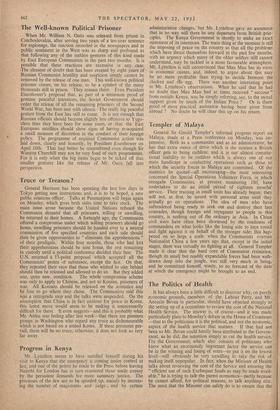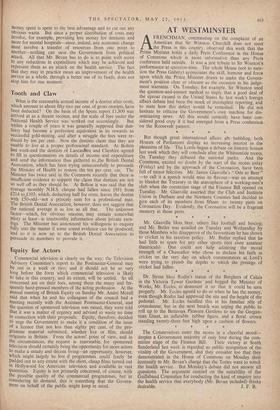The Politics of Health
It has always been a little difficult to discover why, on purely economic grounds, members of the Labour Party, and Mr. Aneurin Bevan in particular, should have objected strongly to the setting up of a committee to review the cost of the National Health Service. The answer is, of course—and it was made particularly plain in Monday's debate in the House of Commons —that to the politicians it is the political, and not the economic, aspect of the health service that matters. If that had not been so Mr. Bevan could hardly have attributed to the Govern- ment, as he did, the intention simply to cut the health service. For the Government, which also consists of politicians who know what an enormously important factor the service can be in the winning and losing of votes—to put it on the lowest level—will obviously be very unwilling to take the risk of making itself unpopular. In fact, when the Minister of Health talks about reviewing the cost of the Service and ensuring the " efficient use of such Exchequer funds as may be made avail- able," he is trying to talk the purest economics—partly because he cannot afford, for political reasons, to talk anything else. The most that the Minister can safely do is to ensure that the money spent is spent to the best advantage and to cut out any obvious waste. But since a proper distribution of costs may involve, for example, providing less money for dentures and more for mental hospitals—since, indeed, any economic change must involve a transfer of resources from one point to another—nothing can save • the Government from political attack. All that Mr. Bevan has to do is to point with scorn to any reductions in expenditure which may be achieved and represent them as an attack on the health service. The fact that they may in practice mean an improvement of the health service as a whole, through a better use of its funds, does not stop him for one moment.



































 Previous page
Previous page